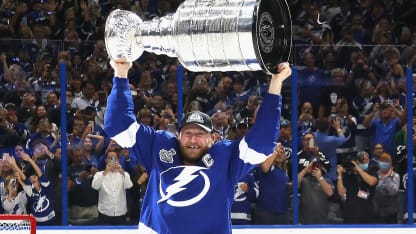When the NHL playoffs began, few expected the Montreal Canadiens to reach the Stanley Cup Final. The Habs finished 18th in overall league standings and were the lowest point-total team to qualify.
Not many minds were changed about Montreal's fortunes when the Canadiens went down three games to one in their opening round series against Toronto. But beginning with Game Five of that first round matchup, the Canadiens went 11-2 over their next 13 games. They rallied to beat the Maple Leafs in seven, swept Winnipeg in the second round, and ousted Vegas in the Semifinals.
Mishkin's Musings: How the Lightning beat the Canadiens
A combination of solid team team defense and depth scoring led the Bolts to their five-game series victory over Montreal

© BRUCE BENNETT/Getty Images
By
Dave Mishkin
TampaBayLightning.com
While not every game during that 13-game run was identical, there were some common elements to Montreal's success. The Canadiens defended well, effectively frustrating and limiting the top players on the other side. Goaltender Carey Price had a role in that, too. He allowed two or fewer goals in 10 of those 13 games. Montreal's penalty kill was outstanding - the Canadiens didn't allow an opposition power play goal in any of those 13 games. They used their quick transition game to score big goals. Many of their speedy forwards generated rush chances and converted on breakaways and other odd-man rushes. And significantly, the Canadiens spent nearly all of those 13 games playing either tied or with the lead. In 11 of the 13 games, the Canadiens never trailed (although they ended up losing one of those games in overtime). During the two contests in which Montreal did trail, the Canadiens rallied for an overtime win in one of them. Their ability to avoid playing from behind helped the Habs settle into their structured defensive system.
So heading into Game One of the Stanley Cup Final, there were several emerging storylines. How would the Lightning deal with Montreal's structure, especially if the Canadiens got the lead? How would the Lightning's lethal power play fare against Montreal's incredible penalty kill? Could the Lightning (more effectively than Toronto, Winnipeg, or Vegas) limit Montreal's counter rush chances?
The Lightning began Game One well, particularly with their attention to defensive detail. Just over six minutes into the first period, Brayden Point hustled back to his own zone and intercepted a pass from Cole Caufield to Jeff Petry. Point fed the puck up ice to Erik Cernak, who gave it to Ondrej Palat and charged ahead to the offensive zone. From the left point in the Montreal end, Palat slid a pass to Cernak in the slot and Cernak deflected the puck over Price's glove.
The Lightning added to their lead in the second period in similar fashion to their first goal. Back pressure from Barclay Goodrow forced a Montreal turnover just inside the Lightning blue line. Jan Rutta moved the puck to Blake Coleman in the neutral zone and Coleman led Goodrow to the Montreal end. Goodrow's shot from the right circle was blocked, but Coleman followed up and snapped a shot that deflected off Yanni Gourde at the top of the crease and into the net at 5:47.
Montreal's most dangerous period was the second. Ben Chiarot hit the post early in the frame. Andrei Vasilevskiy stopped Shea Weber's breakaway. Then, with under two and a half minutes left in the period, the Canadiens broke through. Chiarot's right point shot deflected off both Anthony Cirelli and Ryan McDonagh before caroming into the net.
Two minutes into the third, the Lightning regained their two-goal lead. Once more, the goal came off the rush following a Montreal turnover. Mikhail Sergachev stepped up in the neutral zone and intercepted the puck. He got it to Nikita Kucherov in the Montreal end. Kucherov's right circle centering pass sailed to the front of the net. Chiarot gloved it down, but, with pressure coming from Palat, ended up accidentally knocking it into his own net.
Another goal from Kucherov, this one off an offensive zone face-off win, extended the Lightning advantage at 11:25. Steven Stamkos capped off the scoring with a late power play goal, ending Montreal's long PK streak of successful kills.
It was a solid opening win for the Lightning, who, outside of some isolated strong segments from the Canadiens, controlled most of Game One's action. Much of the pre-series talk centered around Montreal's tight defensive play. But in Game One, it was the Lightning's strong team D that led to their first three goals. The Lightning did win the game, but they lost Alex Killorn to injury for the rest of the series. Killorn blocked a Petry shot late in the second period and, as we learned afterwards, sustained a broken fibula.
Down 1-0 in the series, the Canadiens pushed back hard in Game Two. They generated a handful of rush chances in the first period and then dominated possession during the final 40 minutes. From a standpoint of dictating play, winning puck battles, and applying consistent pressure, Game Two was Montreal's best performance in the series. But the Canadiens also made a couple of significant defensive mistakes that cost them dearly.
Vasilevskiy's busiest game in the series was Game Two. He faced 43 Montreal shots, stopping 42 of them. Thirteen of those came in the first period, a frame in which he denied multiple shots from the line of Nick Suzuki, Caufield, and Tyler Toffoli. The Lightning had done a terrific job in Game One of limiting Montreal's rush opportunities. But the Habs repeatedly broke loose in the first period of Game Two. Vasilevskiy stopped those chances, however, keeping the game tied after 20 minutes.
The Lightning also dealt with a long penalty kill late in the first that carried over into the second. McDonagh was given a double minor for high-sticking and the Canadiens went on back-to-back power plays. The first of those was almost entirely a four-on-three power play. The Lightning got through both kills successfully. But the man advantages seemed to give Montreal momentum. The Canadiens owned virtually all of the possession for much of the frame. They posted 16 of the period's first 18 shots. But they never got the lead. One of those two initial Lightning shots went in - Anthony Cirelli's right point wrist shot got past a screened Price at 6:40. Nearly four minutes later, Suzuki tied it with a power play goal - his backhander deflected off Cirelli and McDonagh (just like Chiarot's Game One tally) and into the net.
With the game tied at one, the Canadiens continued to surge. Vasilevskiy was terrific and, despite their puck management issues, the Lightning dug in defensively and protected the front of their net.
It wasn't until the Lightning received a late second period power play that they were able to end the Montreal surge. They had three power play shots on goal and, unlike the prior minutes in the period, had some possession time.
The Lightning didn't score on that power play and it appeared that the period would end with things still knotted at one. But then came one of the most significant goals in the series. With less than 10 seconds remaining in the period, McDonagh intercepted a puck in the neutral zone and reversed it to Goodrow. At the Montreal blue line, Chiarot didn't back up and keep the play in front of him. It proved to be a costly decision. Goodrow moved the puck past Chiarot and maneuvered around him. That created a two-on-one for Goodrow and Colemen. Weber failed to block the pass across and Coleman, while diving to the ice, smacked the puck over Price's right pad. Officially, the goal came with 1.1 seconds left in the period. It gave the Lightning a lead they wouldn't relinquish.
The Canadiens continued to control a majority of possession in the third, but they couldn't find the tying goal. Instead, the Lightning added to their lead when Palat stole an errant pass from Joel Edmundson and quickly put it in past an unsuspecting Price, who was expecting Edmundson to pass the puck in the other direction.
Outside of their two significant defensive mistakes, the Canadiens felt good about their Game Two performance. At the same time, the Lightning knew they needed to be better, both in terms of puck management and their battle level. And at the start of Game Three in Montreal, the Lightning came roaring out of the gates. Before the first television timeout, the Lightning had a 2-0 lead and an 8-4 advantage in shots. Another Montreal turnover, this one in the defensive zone, led to Rutta's opening goal at 1:52. Following an Eric Staal delay of game minor, the Lightning converted on the power play at 3:27 - Victor Hedman blasted a center point shot off Price and in.
Over the final 13 minutes of the period, though, the Canadiens pushed back. They finished with 17 first period shots and one goal. Vasilevskiy was brilliant in helping preserve the Lightning lead at 2-1. The intermission allowed the Lightning to regroup and they started the second similarly to how they began the first.
Two more goals early in the period extended the lead to 4-1. Both tallies came off the rush, as the Lightning capitalized on more Montreal defensive mistakes. A slow Montreal line change, combined with an alert stretch pass from Cernak, allowed Palat and Kucherov to score on a two-on-zero rush. Shortly thereafter, an ill-advised pinch from Petry led to a two-on-one goal for Tyler Johnson.
Unlike in the first, the Canadiens didn't push back in the second after the two Lightning goals. The Montreal attack was mostly quiet, until Suzuki scored off the rush with 1:56 left in the frame. It was a shot Vasilevskiy typically stops - the puck slid under his right pad - but the goal gave Montreal some life. Vasilevskiy made a key save on Weber before the period ended to keep the score at 4-2.
For the most part, the Lightning managed the third period well and limited the amount of time they had to spend in their own end. Still, the Habs posted 10 third period shots, several of which were dangerous. But thanks to Vasilevskiy, they never even got within a goal of the Lightning. Johnson recorded his second of the game, finishing his own rebound at 15:19. Corey Perry answered that tally with a perfect shot into the top of the net at 15:58. Soon after, Chiarot had a glorious chance off the rush, but Vasilevskiy stopped the close-range shot with his right arm and body. Coleman sealed the win with an empty-netter on the next shift.
Through the first three games of the series, the Lightning hadn't allowed the Canadiens to play with the lead. That dynamic changed in Game Four. Despite a good start for the Lightning, one in which they dominated possession in the first, they fell behind 1-0. Josh Anderson converted a shot from the slot at 15:39 of the first. It was just Montreal's second shot on goal in the period. But it allowed the home team to settle into the defensive structure that had served them so well earlier in the playoffs.
And for much of the second period, the Canadiens looked to be in synch defensively. Unlike the first, in which the Lightning had plenty of time and space, the Canadiens locked things down in the second. The Lightning had far less possession time and fewer opportunities to score. Before they did tie the game late in the frame, the Lightning's best looks after Anderson's goal came on two of their first three power plays. Point and Hedman hit posts during those man advantages and Kucherov missed an open net.
But eventually, the Lightning did tie the game. With less than three minutes left in the period, McDonagh blocked an outlet from Petry and held the puck in the offensive zone. He set up Coleman for a shot from the right circle and went to the front of the net. Price stopped Coleman's shot, but McDonagh grabbed the rebound and slid a no-look, backhand pass to Goodrow in the slot. Goodrow finished into an open net, tying the game.
Just as they did in the first, the Lightning controlled most of the action in the third. Early on, Price came up with his best save of the night, robbing Kucherov on a backdoor feed. The game remained 1-1 until Alexander Romanov wristed a right point shot past a screened Vasilevskiy at 8:48. The goal came with six players (three on each side) in the penalty box serving roughing minors. For the Lightning, it was the entire Gourde line. This meant that, until those players came out of the box, Tyler Johnson's line was going out every third shift. With no whistle coming in the minutes after Romanov's goal, Johnson's line got three shifts. Johnson had a breakaway chance on the first shift and Price made the save. But on the third shift, Mathieu Joseph and Pat Maroon converted on a two-on-one - Joseph delivered a saucer pass that Maroon one-timed into the net.
The Lightning had the better chances down the stretch in the third. With under three minutes left, Kucherov redirected a McDonagh pass off the post - the third post the Lightning hit in the game. Then came the four-minute penalty to Weber after he high-sticked Palat with a minute to go in regulation. The Lightning had a chance to win the game, the series, and the Stanley Cup with a goal. But Montreal's PK came through. Price made four saves along the way, but the Habs did a wonderful job in front of him, too. A minute after the penalty ended, Anderson won it. He scored his second of game, jumping on a loose puck at the side of the net and swatting it in.
Game Five featured sound defensive play from both teams. Scoring chances were few and far between. The clubs delivered a combined six successful penalty kills. Both goalies were sharp and on their game. Ultimately, the Lightning got the one goal that was scored. The play started with a wall battle just inside the Montreal blue line. Three players from each side were involved and the Lightning came up with it. McDonagh collected the puck at the left point and moved to the center point. With so many players flooded to one side of the ice, David Savard had room to accept a pass from McDonagh and skate to the right circle. At the same time, Ross Colton outmuscled Edmundson to gain position at the top of the crease. He redirected Savard's perfectly-placed pass into the net at 13:27 of the second.
Vasilevskiy stopped Anderson's partial breakaway early in the third and that was Montreal's best opportunity to tie it. Goodrow blocked two shots in the closing minutes. The first came on a Weber blast that left him momentarily hobbled. But he was able to get off the ice after that initial block. And then he didn't miss a shift. In the final minute, he blocked Petry's shot and the puck ricocheted out of the zone. The Canadiens moved it back in, but McDonagh killed time by protecting the puck along the end boards and eventually Gourde cleared it safely back to the Montreal end. Seconds later, the Lightning knew they had won their second straight Stanley Cup.
There were several keys to the Lightning's series win. Over the course of the five games, the Lightning defended better than the Canadiens. They made fewer mistakes. And fewer of their mistakes turned out to be costly. Price was terrific in Games Four and Five, but he acknowledged afterwards that he needed to play that way earlier in the series. At the other end, Vasilevskiy allowed only eight goals over the five games and was outstanding in those moments when the Canadiens surged. Montreal's PK was more successful than the units on the other teams that faced the Lightning this playoff year. It momentarily saved the Habs' season with a 5-5 performance in Game Four. But the Lightning's power play did pop in two goals - and Hedman's Game Three PPG was a big one early on. And the Lightning's PK was also impactful. The Lightning allowed only one power play goal over the five games and came up with three significant kills in Game Five when the contest was still scoreless.
The Lightning turned the tables on Montreal's previous formula for success. The Habs only led in one of the five games. Instead, the Lightning forced Montreal to chase and didn't allow the Canadiens to settle into their play-with-the-lead structure.
From Games Two to Five, the Canadiens managed to limit Point and Kucherov to two combined points. There were some posts and near misses along the way, but at the end of the day, the Habs accomplished what they felt they needed to in keeping the point totals down for those two players. But the Lightning still prevailed. That's because they combined great team defense with a balanced attack. The line of Johnson, Joseph, and Maroon (put together after Joseph came into the lineup following Killorn's injury) scored three goals. Gourde's line tallied four, including Coleman's highlight-reel strike in Game Two. Then there was Colton, who netted the only goal of Game Five.
In the end, that's the biggest storyline from this series and this Cup run for the Lightning. They received contributions from everyone - up and down the lineup. All the players pulled on the rope together - and in the same direction. That's what it takes to win the Stanley Cup. And, for the Lightning, it's what they've now done for two consecutive seasons. Congratulations!


















